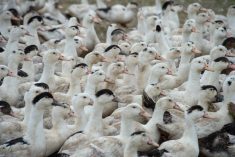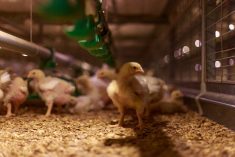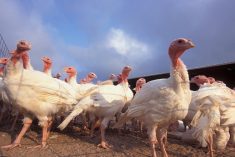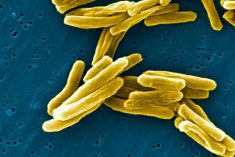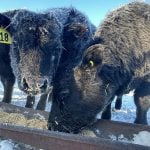British Columbia’s poultry producers no longer need federal permits to move their wares in the province.
The Canadian Food Inspection Agency confirmed Wednesday it has removed its avian influenza primary control zone (PCZ) — a zone which had covered the entire southern half of B.C., including Vancouver Island and the Queen Charlotte Islands.
CFIA in December set up the PCZ — including “infected,” “restricted” and “security” subzones — after five poultry farms in the Fraser Valley had been confirmed with highly pathogenic H5N2 avian flu.
Read Also

CBOT Weekly: Additional soybean purchases strengthen U.S. soy
There were good gains for the Chicago soy complex during the week ended Feb. 4, due to positive news that Wednesday.
That number would expand to 11 commercial farms and one “non-commercial” farm before the end of December. Birds on another non-commercial property in the region were found last month to have an H5N1 strain of avian flu.
CFIA said Wednesday its disease control measures — and farmers’ “ongoing biosecurity efforts” — have prevented further spread of the virus. Neither H5N2 nor H5N1 have been confirmed in any domestic poultry in Canada since the H5N1 finding on Feb. 2 this year.
All of the infected premises in the province have now completed their required cleaning and disinfection procedures under CFIA oversight, the agency said.
Three of the properties — the two non-commercial farms at Aldergrove and Chilliwack, and a table egg farm at Langley — are still in the midst of a 21-day post-disinfection quarantine “to satisfy international requirements.”
Movements to and from those farms remain under CFIA control until the quarantines are lifted, the agency said.
CFIA in mid-February shrunk its “restricted” zone after five of the affected properties came out of quarantine. Its northern boundary, previously the Fraser River, is now the Trans-Canada Highway.
“Normal trading”
Surveillance testing of domestic poultry must also continue throughout B.C. for 90 days after cleaning and disinfection are complete on all infected premises, CFIA added.
The surveillance program is a requirement from the World Organization for Animal Health (OIE) for countries re-establishing avian flu-free status after an outbreak.
Up until December, Canada had been considered high-path avian flu-free by OIE standards since April 2008, following an outbreak of high-path H7N3 on a poultry farm in southern Saskatchewan.
Assuming no new cases turn up in the 90-day period, CFIA said, the federal government “will work with its trading partners to return to normal trading requirements as quickly as possible.”
Countries including the U.S., South Korea, Hong Kong, South Africa, Mexico, Taiwan and Japan have imposed varying degrees of bans on Canadian poultry products due to the Fraser Valley outbreaks.
CFIA on Wednesday hailed the provincial agriculture ministry, poultry industry associations, marketing boards and “individual bird owners” for their co-operation and support, which the agency said were “critical to the successful control of this outbreak and the removal of the PCZ.” –– AGCanada.com Network




